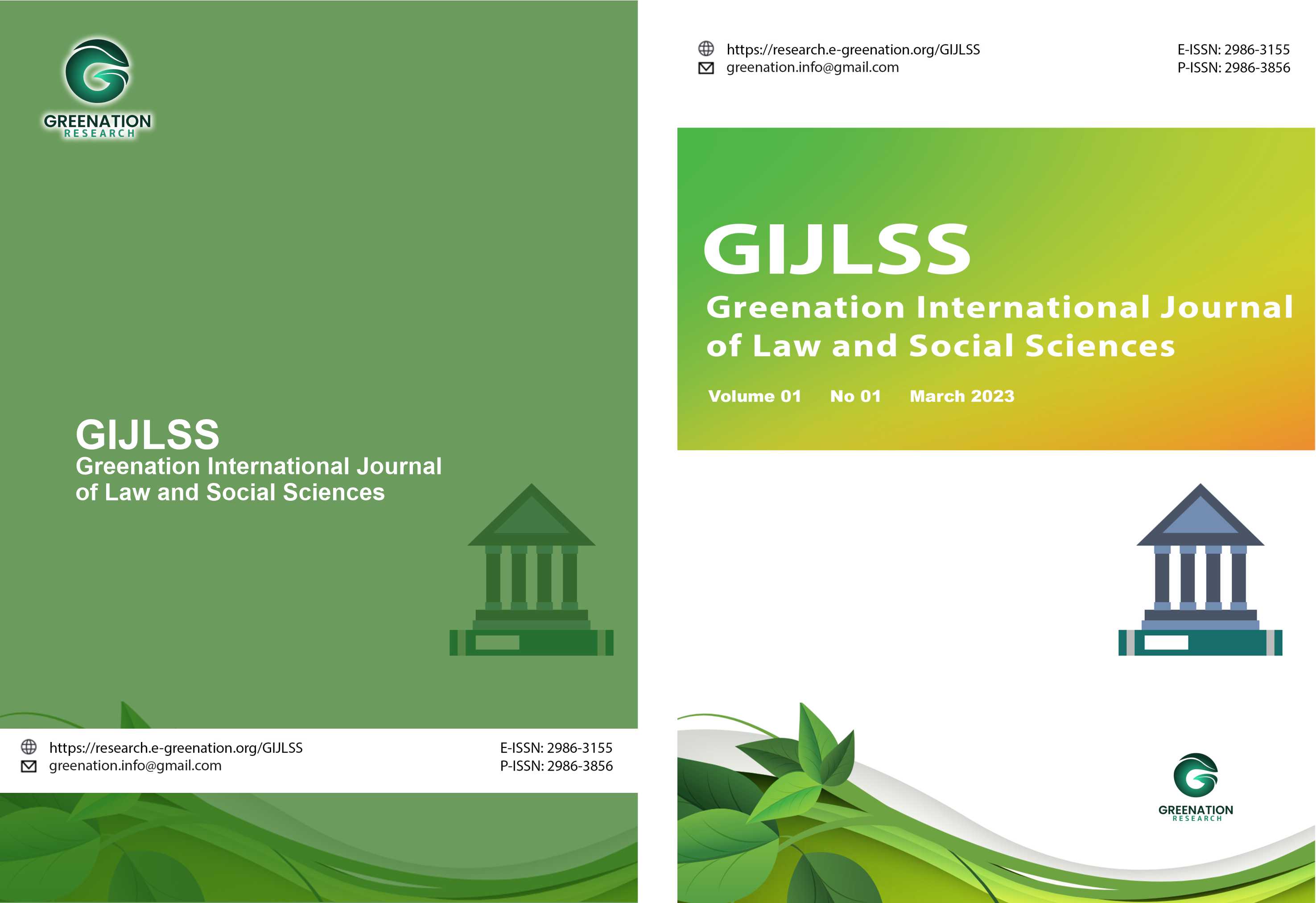The Urgency of Legal Reform in the Implementation of the Revocation of Political Rights as an Additional Sanction for Corruption Offenders in Indonesia
DOI:
https://doi.org/10.38035/gijlss.v3i2.406Keywords:
Legal Reform, Additional Criminal Sanctions, Revocation of Political Rights, Corruption, Legal InconsistencyAbstract
Corruption is an extraordinary crime that undermines the governance system and democracy. One form of additional criminal sanctions applied to corruption offenders in Indonesia is the revocation of political rights. This sanction aims to prevent corrupt individuals from returning to public office and minimize the risk of repeated corruption offenses. However, in practice, the implementation of the revocation of political rights for corrupt individuals still shows various legal inconsistencies. Some court rulings include this sanction, while others do not, even though the defendants have the same role in the corruption offense. Additionally, the lack of clear standards regarding the duration and mechanism of the revocation of political rights further exacerbates legal uncertainty. Therefore, legal reform is needed to ensure that the revocation of political rights for corrupt individuals can be applied consistently and effectively. This study uses a normative legal method with a statutory approach, a conceptual approach, and a comparative approach. The legal materials used consist of primary, secondary, and tertiary legal sources, which are systematically analyzed to identify existing legal problems and find appropriate solutions for the reform of additional criminal sanctions in the form of the revocation of political rights for corrupt individuals. Legal reform is expected to clarify the rules regarding the revocation of political rights, both in terms of application, duration, and mechanism. With legal certainty in the revocation of political rights, it is hoped that it will strengthen efforts to eradicate corruption and maintain the integrity of the democratic system in Indonesia.
References
Arifin, M. Z. (2024). Tindak Pidana Korupsi Kerugian Ekonomi dan Keuangan Negara (Perspektif Hukum dan Praktik). Jakarta: PT Publica Indonesia Utama.
Atmoko, D. &. (2022). Penegakan hukum terhadap tindak pidana korupsi ditinjau dari perspektif dampak serta upaya pemberantasan. Binamulia Hukum, 11(2), 177-191.
Botutihe, D. &. (2024). Konstitusionalitas Pemenuhan Hak Dipilih Mantan Terpidana Dalam Pemilihan Kepala Daerah (Studi Perbandingan Amerika Serikat Dan Belanda). Jurnal Al Himayah, 8(1), 68-89.
Cibro, C. J. (2022). Penjatuhan Pidana Tambahan Pencabutan Hak Politik Terhadap Pelaku Tindak Pidana Korupsi Terkait Jabatan Publik. Locus Journal of Academic Literature Review, 191-197.
Devi, C. (2021). Kajian Hukum Pencabutan Hak Politik Pada Pelaku Tindak Pidana Korupsi Suap Berdasarkan Teori Kepastian Hukum. Yustisia Tirtayasa: Jurnal Tugas Akhir, 1(1).
DM, M. Y. (2022). PEMBERIAN PIDANA TAMBAHAN TERHADAP PENCABUTAN HAK-HAK POLITIK TERPIDANA KASUS KORUPSI BERDASARKAN PERATURAN PERUNDANG-UNDANGAN. The Juris, 6(2), 587-598.
Farcham, M. F. (2024). Pencabutan Hak Politik Pada Tindak Pidana Korupsi: Apakah Perlu. Sanskara Hukum dan HAM, 3(02), 57-67.
Hambali, A. R. (2021). Politik Hukum PERMA Nomor 1 Tahun 2020 dalam Mewujudkan Keadilan dan Kepastian Hukum terhadap Pemidanaan Pelaku Korupsi. Jurnal Wawasan Yuridika, 5(2), 200-223.
Harefa, A. Z. (2024). Pengaruh Pencabutan Hak Politik Terhadap Pelaku Tindak Pidana Korupsi Di Indonesia. Jurnal Education and Development, 12(1), 425-431.
Haris, O. K. (2024). Pemberian Sanksi Pidana Tambahan Pencabutan Hak Politik Terhadap Terpidana Korupsi. Halu Oleo Legal Research, 6(3), 755-772.
Hariyani, H. F. (2016). Analisis faktor-faktor yang memengaruhi korupsi di kawasan Asia Pasifik. Jurnal Ekonomi Dan Kebijakan Pembangunan, 5(2), 32-44.
Indah, D. F. (2020). Pencabutan Hak Politik Pelaku Tindak Pidana Korupsi dalam Perspektif Hak Asasi Manusia. Risalah Hukum, 68-82.
Mulatua, S. &. (2019). Efektifitas Pidana Tambahan Uang Pengganti Dalam Tindak Pidana Korupsi. Legalitas: Jurnal Hukum, 9(1), 46-79.
Nugraha, A. S. (2020). Implementasi Sanksi Pencabutan Hak Pilih Mantan Koruptor: Tinjauan Dari Perspektif Hak Asasi Manusia Indonesia. Syiah Kuala Law Journal, 4(3), 285-301.
Nuna, M. &. (2019). Kebebasan Hak Sosial-Politik Dan Partisipasi Warga Negara Dalam Sistem Demokrasi Di Indonesia. Jurnal Ius Constituendum, 4(2), 110-127.
Pinem, S. Z. (2023). DINAMIKA PEMBERANTASAN TINDAK PIDANA KORUPSI DI INDONESIA. Jurnal Yuridis, 10(2), 87-94.
Puanandini, D. A. (2024). Korupsi sebagai Kejahatan Luar Biasa: Analisis Dampak dan Upaya Penegakan Hukum. Public Sphere: Jurnal Sosial Politik, Pemerintahan dan Hukum, 3(3).
Santoso, R. (2019). Peran Komisi Pemilihan Umum dan partai politik dalam mewujudkan demokrasi berintegritas. Nizham: Jurnal Studi Keislaman, 7(02), 252-261.
Siregar, M. G. (2024). Pemberantasan Korupsi di Indonesia: Dilema antara Penegakan Hukum dan Kepentingan Politik. Politica: Jurnal Hukum Tata Negara dan Politik Islam, 11(2), 225-236.
Waluyo, B. (2017). Upaya Taktis dan Strategis Pemberantasan Korupsi di Indonesia. Lex Publica, 4(1), 623-630.
Downloads
Published
How to Cite
Issue
Section
License
Copyright (c) 2025 Eva N Christianty, KMS Herman

This work is licensed under a Creative Commons Attribution 4.0 International License.
Copyright :
Authors who publish their manuscripts in this journal agree to the following conditions:
- Copyright in each article belongs to the author.
- The author acknowledges that the Greenation International Journal of Law and Social Sciences (GIJLSS) has the right to be the first to publish under a Creative Commons Attribution 4.0 International license (Attribution 4.0 International CC BY 4.0).
- Authors can submit articles separately, arrange the non-exclusive distribution of manuscripts that have been published in this journal to other versions (for example, sent to the author's institutional repository, publication in a book, etc.), by acknowledging that the manuscript has been published for the first time at GIJLSS.























